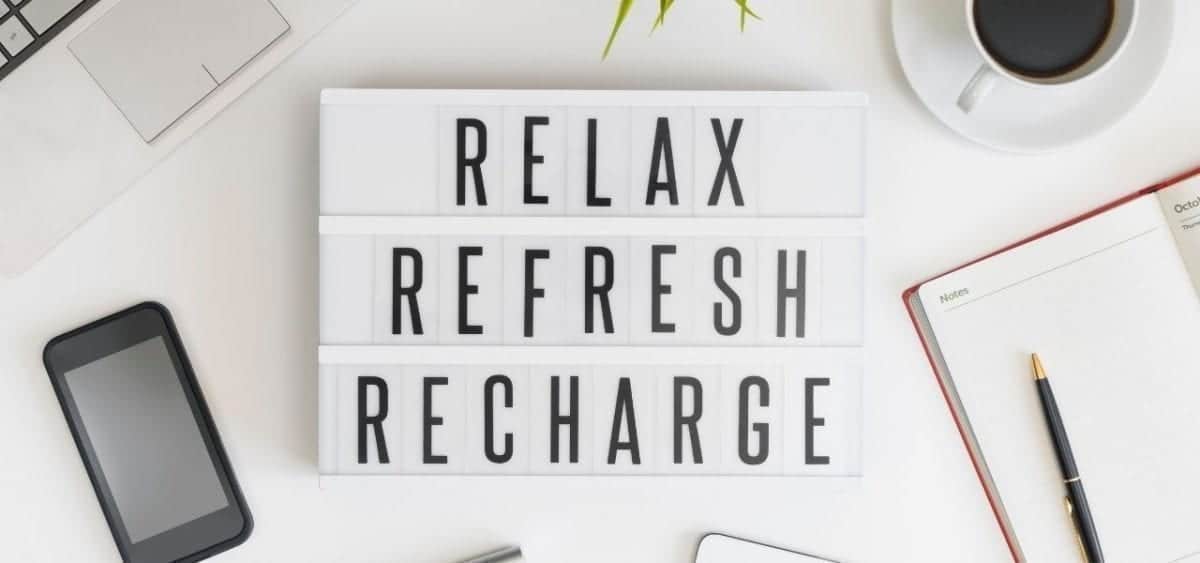Home > Emotional wellbeing > Mental health > Destressing: 10 quick ways to destress


With stresses coming from all directions at the moment, work, financial, health, not leaving your home for six months because of a global pandemic…. It’s easy to let stress get on top of you. This, in turn, impacts on all the interactions you have with other people. This post covers ten small steps for destressing your life.
Any threat to your wellbeing can cause you to become stressed. It’s thought to be our body’s way of dealing with challenging situations. It’s therefore essential to our survival because it heightens our awareness and triggers our fight or flight response. This is where we either confront the danger/threat/stress head-on or run in the opposite direction.
Cortisol is our primary stress hormone and is released when we feel stressed. If we are stressed for long periods of time, it can start to affect our blood pressure, our sleep patterns and our memory function. It also lowers our immune systems, making us more susceptible to infections. When you feel like you have too many stresses happening at once (or one big stress playing on your mind), it’s time to find small ways to de-stress to reset your physical and mental wellbeing.
You’ve probably heard the saying: ‘laughter is the best medicine’, but it’s pretty spot on where stress is concerned. Research has shown that laughter actually lowers your blood pressure and decreases anxiety levels. Experts suggest that face-to-face laughter using eye contact works best, so if stress is getting the better of you, call that friend who makes you laugh and plan to meet up. For an even quicker de-stress, re-watch the comedy shows that make you laugh out loud every time. It’s hard not to laugh at Ross getting a spray time for the first time in Friends, or re-runs of Alan Partridge or Faulty Towers.
Just keep them saved on your TV planner for when your stress levels threaten to overwhelm you.
There are countless studies that show practicing yoga, especially if you can manage it on a continual basis, lowers stress and anxiety levels.
Yoga teaches us to breathe properly, focus on one area of our body at a time and increases the blood flow around our bodies. It builds flexibility and strength which in turn drains our lymph nodes boosting immunity. Yoga also helps to regulate our cortisol levels and teaches us how to relax. Lilly, 27, agrees with the benefits of yoga: “My mum did loads of yoga in the ’80s, so I’d always written it off as a mom fad,” she laughs. “So much has changed! After my first yoga class I felt the same as if I’d run a long run, but somehow more peaceful and appreciative of what my body could do. And there were no seventies leotards in sight!”
According to a study published in Frontiers in Psychology, spending just 20 minutes in nature every day lowers our cortisol levels dramatically. Another study showed spending just two hours or more in nature every week increased your sense of wellbeing. Spend lunch breaks outdoors at a nearby park if you can, rather than sitting in front of your computer. Walk to and from work if it’s close enough or wake up early and watch the sunrise before you start your day. Personally, it’s watching birds in my garden and identifying them that makes me really connect with nature.
Science has lots to say about the benefits of swimming on both your physical and mental wellbeing. It’s not just an all-body workout, but being surrounded by water, whilst breathing rhythmically as well as concentrating on the technique of your swimming strokes can have a really therapeutic effect.
Regular swimming lowers anxiety levels, stress and can help with depression. It can also help to regulate your sleep patterns, as you’ll release endorphins post-swim. It doesn’t have to be swimming lengths, a quick dip in the sea or a safe open water spot will work wonders for your mental health. “I never really learned to swim properly as a child,” admits Sara, 30. “So in my mid-twenties I enrolled in adult swimming classes and now I regularly swim with an open water swimming group who’ve become firm friends.”
According to studies, none of us is breathing properly, so it’s good to remind yourself how it should be done. Diaphragmatic breathing reduces anxiety and helps detoxify our bodies. It can be really useful in stressful situations when we need to calm ourselves down quickly. Here are tips on how to do a daily breath-focused activity:
Listening to classical music can have a hugely calming effect on our busy minds by distracting us as we become absorbed in the music. Music tastes vary and everyone has songs that help them to tune out. However, the gentleness combined with the complexity of classical music can calm you just by listening to it. Classic FM’s list of the most relaxing pieces of classical music suggests anything by Einaudi or try Air on a G string by Bach. Just put your headphones on (try noise-canceling headphones to block out the outside world) and tune out.
Who would have thought the humble house plant would go as far as to reduce stress, cough and colds, boost creativity and your mood and clean your air by absorbing the toxins in your environment? Plus, there’s all that oxygen they’re producing and pumping out! If you’re a houseplant novice, start with something simple like a spider plant which is very easy to grow and maintain. If you’re terrible with remembering to water plants, try cactuses which only need watering once a week. For a large but easy-to-manage house plant, try a Monstera Deliciosa which are really easy to grow. Try Patch Plants if you want them delivered!
Selenium is an important mineral that our bodies need for a healthy immune system, cognitive function and our fertility systems. It has also shown to help reduce your stress levels and the best way to increase selenium is through what we eat. Brazil nuts, eggs and sardines are all high in selenium as well as sunflower seeds to snack on.
Chia seeds have also been shown to lift your spirits as they contain magnesium. Magnesium helps regulate cortisol levels and can also help us get a good night’s sleep. Luckily, dark chocolate is rich in magnesium, just make sure the cocoa content is more than 80%.
There’s nothing like some calming crafts to de-stress you after a long day. Concentrating on crafts pushes your worries to one side as you focus on the activity in front of you. There are plenty of books, tutorials and blogs for learning how to sew or knit or even taking on bigger projects like crochet and quilting. Art therapy benefits are well researched and painting or coloring in, can have therapeutic effects on your wellbeing.
The great thing about channels like YouTube is that all the forgotten shows from your childhood still exist online. Just as long as you can cope with a slightly grainier screen and sound quality, you can re-watch them all again. Search through old kids tv programs, to be transported (and de-stressed) back to being 8 years old.
Disclaimer: This website does not provide medical advice. The information, including but not limited to, text, graphics, images and other material contained on this website are for informational purposes only. No material on this site is intended to be a substitute for professional medical advice, diagnosis or treatment. Always seek the advice of your physician or other qualified health care provider with any questions you may have regarding a medical condition or treatment and before undertaking a new health care regimen, and never disregard professional medical advice or delay in seeking it because of something you have read on this website.

-


Dr Singh is the Medical Director of the Indiana Sleep Center. His research and clinical practice focuses on the myriad of sleep.

What does spotting before your period look like? Spotting is a few drops of blood on your underwear that are not enough to soak a pad. It’s typically brown, light pink, or red and may only be noticeable on a

Postpartum hormonal changes: What are they? Postpartum hormonal changes occur when your body experiences shifting hormone levels after birth. After your baby is born, the doctor removes the afterbirth or placenta, which sends signals to your body that you’re no

What is ovulation fatigue? As women, we can get numerous symptoms throughout our menstrual cycles. One question we’re asked is, “Why do you get tired during ovulation?” For some, the answer could be ovulation fatigue. Ovulation fatigue is when you
Hormona© 2025, All Rights Reserved
| Cookie | Duration | Description |
|---|---|---|
| cookielawinfo-checkbox-analytics | 11 months | This cookie is set by GDPR Cookie Consent plugin. The cookie is used to store the user consent for the cookies in the category "Analytics". |
| cookielawinfo-checkbox-functional | 11 months | The cookie is set by GDPR cookie consent to record the user consent for the cookies in the category "Functional". |
| cookielawinfo-checkbox-necessary | 11 months | This cookie is set by GDPR Cookie Consent plugin. The cookies is used to store the user consent for the cookies in the category "Necessary". |
| cookielawinfo-checkbox-others | 11 months | This cookie is set by GDPR Cookie Consent plugin. The cookie is used to store the user consent for the cookies in the category "Other. |
| cookielawinfo-checkbox-performance | 11 months | This cookie is set by GDPR Cookie Consent plugin. The cookie is used to store the user consent for the cookies in the category "Performance". |
| viewed_cookie_policy | 11 months | The cookie is set by the GDPR Cookie Consent plugin and is used to store whether or not user has consented to the use of cookies. It does not store any personal data. |
